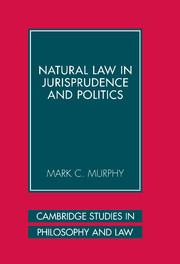Book contents
- Frontmatter
- Contents
- Acknowledgments
- Natural Law in Jurisprudence and Politics
- Introduction: Natural Law Jurisprudence and Natural Law Political Philosophy
- 1 Natural Law Jurisprudence Formulated
- 2 Natural Law Jurisprudence Defended
- 3 The Common Good
- 4 The Natural Law Rejection of Consent Theory
- 5 A Consent Theory of the Authority of Law
- 6 The Authority of Law and Legal Punishment
- 7 Beneath and Beyond the Common Good
- Works Cited
- Index
1 - Natural Law Jurisprudence Formulated
Published online by Cambridge University Press: 10 March 2010
- Frontmatter
- Contents
- Acknowledgments
- Natural Law in Jurisprudence and Politics
- Introduction: Natural Law Jurisprudence and Natural Law Political Philosophy
- 1 Natural Law Jurisprudence Formulated
- 2 Natural Law Jurisprudence Defended
- 3 The Common Good
- 4 The Natural Law Rejection of Consent Theory
- 5 A Consent Theory of the Authority of Law
- 6 The Authority of Law and Legal Punishment
- 7 Beneath and Beyond the Common Good
- Works Cited
- Index
Summary
The Fundamental Claim of Natural Law Jurisprudence
Natural law political philosophy takes its lead from natural law jurisprudence. For natural law jurisprudence most fundamentally claims that law is backed by decisive reasons for compliance, whereas natural law political philosophy attempts to describe the conditions in which law, in this sense, is present.
The immediate challenge faced by defenders of the thesis that law is backed by decisive reasons for compliance is that it seems open to obvious and devastating objection by counterexample. For that thesis appears to entail that if one does not have decisive reason to comply with a dictate, then that dictate is not law. But it seems that we readily acknowledge as law dictates for which we do not, or would not have had, decisive reasons for compliance. The Fugitive Slave Act of 1850 required citizens not to hinder, and even to aid, federal marshals who sought to return runaway slaves to bondage. This act was passed in order to enforce a Constitutional provision and was enacted in due form by the federal legislature. It was socially acknowledged and judicially enforced. It seems that, as a matter of social practice, the Fugitive Slave Act was law – regardless of the fact that those under it did not have decisive reason to comply with it. It thus serves nothing but obfuscation to deny that the Fugitive Slave Act was law.
- Type
- Chapter
- Information
- Natural Law in Jurisprudence and Politics , pp. 8 - 24Publisher: Cambridge University PressPrint publication year: 2006
- 1
- Cited by

